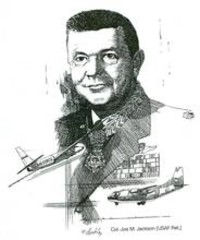Hall of Fame
Jackson, Joe. M.

Joe M. Jackson was born in Heard County and reared in Newnan, Georgia. He enlisted in the Army Air Corps in March, 1941, where he served as a B-25 crew chief. Accepted for Aviation Cadet pilot training, he received his commission and wings in 1943 and was a gunnery instructor at Eglin Field, Florida. In training for a combat assignment when World War II ended, he was assigned to the Army of Occupation in Germany as a fighter pilot flying P-47s. Jackson returned to the United States and was assigned to the 27th Strategic Fighter Escort Wing at Kearney, Nebraska, and later at Bergstrom AFB, Texas, where he flew 51s, F-82s, and F-84s. It was in 1950 that Captain Jackson made a significant contribution to jet fighter instrument procedures with his "tear-drop jet penetration." During the Korean War, he was promoted to major, and served as operations officer and later as executive officer of the 524th Fighter Squadron, flying F-84Gs. On his Korean tour of duty he flew 107 combat sorties. In 1956, Major Jackson became one of the first Air Force U-2 pilots, commanding detachments and supervising reconnaissance operations throughout the world. Jackson developed the plan and directed reconnaissance flights over Cuba that contributed to the successful resolution of the Cuban Crisis in 1962 and to the withdrawal of the Soviet Union's offensive missiles. He was promoted to lieutenant colonel in the same year.
In 1968, following a tour in Europe, Lt Colonel Jackson, who had twenty years experience as pilot of fighter and reconnaissance planes, was assigned to Vietnam where he flew 296 combat sorties. Jackson distinguished himself as a pilot on May 12, 1968, at Kham Duc, Republic of Vietnam, as he maneuvered the lumbering unarmed Fairchild C123 Provider transport in position for a landing at the beleaguered Special Forces camp that had been overrun by hostile forces, in a desperate rescue of a three-man Combat Control Team. The mission was successful and for his heroic action under brutal enemy fire, Colonel Jackson was awarded the Medal of Honor on January 16, 1969. His citation reads in part: "Lt Colonel Joe Jackson's profound concern for his fellow man at great risk of his own life above and beyond the line of duty are in keeping with the highest tradition of the U.S. Air Force and reflects great credit upon himself and the Armed Forces of his country." In addition to the Medal of Honor, Colonel Jackson's other awards include: the Legion of Merit, Meritorious Service Medal, the Distinguished Flying Cross with one Oak Leaf Cluster, the Air Medal with six Oak Leaf Clusters, and the Air Force Commendation Medal with three Oak Leaf Clusters. Colonel Jackson's Air Force career spanned more than 32 years. Upon retirement from the Air Force, Colonel Jackson was employed by Boeing from which he retired in 1985.
Colonel Joe M. Jackson, whose concern for his fellow man led to heroic action and brought recognition with the Medal of Honor, was enshrined in the Georgia Aviation Hall of Fame May 16, 1998.
